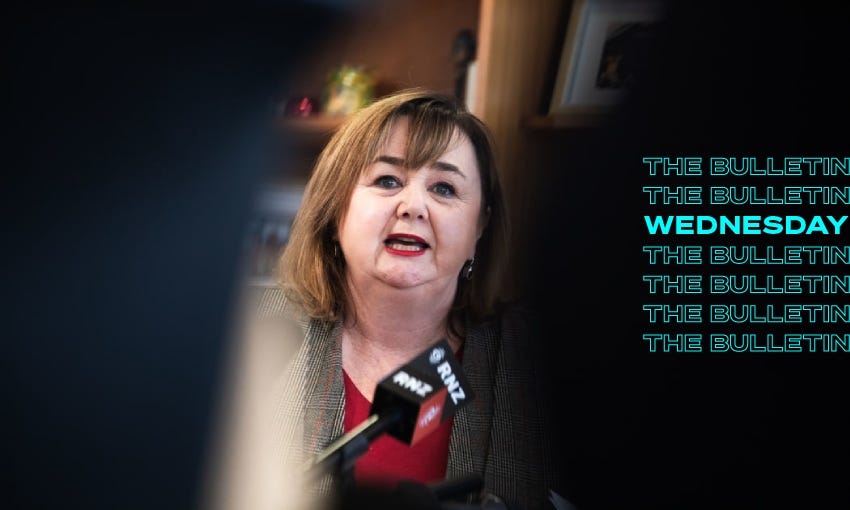The root cause of the housing crisis
Not enough houses have been built in the right places, for the right prices. This was confirmed in a review of emergency housing yesterday, a day after the door was thrown open to more migrant workers
In today’s edition: reports that half-price public transport will end in March; smokefree legislation passes third reading; Luxon keeps his cards close to his chest on his political future; but first, a review confirms the cause of the housing crisis as we get ready to welcome more migrant workers
Housing minister Megan Woods said the emergency housing review confirmed the root cause of the housing crisis (Image: RNZ/Samuel Rillstone)
Spanish wine and staff shortages
I went out for dinner for the first time in a while last night. We were told immediately that one area of the restaurant wasn’t open because they were short-staffed and that the food would take a while. After obnoxiously ordering a Spanish outlier from the wine list, I could tell the poor guy behind the bar was new and still familiarising himself with the list. All the stories I’ve read about understaffing and, in all likelihood, the impact of rising Covid cases, were distilled into a personal anecdote. I could see why the immigration changes announced on Monday and described by BusinessDesk’s Pattrick Smellie (paywalled) as “a massive immigration policy bombshell”, were welcomed by business.
Basic human rights standards sorely lacking in emergency housing
While the prime minister's hot mic might have dominated yesterday afternoon’s news agenda, a decidedly cool appraisal of emergency housing from the Human Rights Commission also landed yesterday. The Commission found that basic human rights standards were sorely “lacking in parts of our emergency housing system”. The report coincided with the government’s “reset” of emergency housing as it responded to a review of the system and accepted all of the review’s recommended actions. Thanks to the work of journalists like Kristin Hall and her Sunday feature on emergency housing in Rotorua in September, emergency housing has loomed far larger this year than in any of the years since its introduction in 2016.
The root cause of the housing crisis
In responding to the review, housing minister Megan Woods said it confirmed the root cause of the housing crisis. “Not enough houses have been built in the right places, for the right prices, and of the right types to meet people’s needs,” said Woods. The government will investigate increasing supply of supported housing in Hamilton and Wellington. This is where we arrive back at the immigration announcement. In a detailed analysis of that and its interplay with infrastructure investment, Bernard Hickey writes “Aotearoa Inc hasn’t invested nearly enough in housing, water and transport infrastructure to cope with past population growth, let alone future growth. Labour’s determination to address the infrastructure shortage through tighter migration settings, rather than higher taxes, debt and investment, lasted just a few months.”
Why the government moved on immigration despite our infrastructure challenges
At the post cabinet press conference on Monday, Hickey asked why the government was going ahead with another loosening of migration settings when it had no advice about the likely effects on inflation, rents, employment or infrastructure shortages. Smellie suggests two reasons in his column: “the government’s stocks are in the toilet with most of the business community” and that in a cost of living crisis, more workers will inevitably drive down wage inflation. Those may be the answers, but Stuff’s Dileepa Fonseka rounds out a year of sharp immigration policy analysis by posing another question, asking why the government can’t articulate a clear vision of what they want out of immigration. It’s a far more consequential question than the one I asked last night about a little glass of Albariño.
The quiet sector making an outsized difference
As borders reopen and the world’s population again starts itching to explore, New Zealand’s international education sector is working both to find new opportunities and reopen old ones. In partnership with Education NZ, over the last year The Spinoff has produced a series of in-depth and thought-provoking feature articles about the sector and what it provides to Aotearoa – everything from its buoying effect on our tech sector to the simple, crucial importance of cultural exchange. Read the full series now on The Spinoff (sponsored).
Reports half price public transport fares to come to an end
Stuff’s Luke Malpass is reporting this morning that half-price public transport fares will come to an end on March 31 next year. Cabinet is also deciding on whether the cut to the fuel excise and road user charges will continue beyond January 2023 today. The universal half price public transport fares will be replaced by permanent and targeted support for community services card. Any extension of the fuel discount requires legislation to be passed as the Herald’s Thomas Coughlan reported last week. The house rises for the year tomorrow. Treasury will publish the government’s economic and fiscal forecasts (HYEFU - Half-Year Economic and Fiscal Update) today and an announcement on extending the fuel tax cut will likely be tied to that. This piece (paywalled) wasn’t bylined when I looked at it this morning but as it’s a 12 minute read on HYEFU in the Herald, I’m picking it’s also from Coughlan.
An end of year interview with Christopher Luxon
National party leader Christopher Luxon sat down with Newshub’s Jenna Lynch last night for an end of year interview. When asked whether he would stay on as leader of the party or an MP if National lost next year’s election, Luxon said he hadn’t thought about it. Luxon confirmed that the cost of the party’s tax indexation policy was pegged at $1.7b annually and pointed to finding “the huge amount of waste” in current government spending as a way to fund it. Luxon pre-empted the price of cheese question, pricing a block around “close to 20 bucks”. Absolutely correct for a block of Mainland Tasty. Lynch also pressed him on how much a couple gets on superannuation - he was out by $94 but jumped straight into the case for lifting the retirement age. Stuff’s former chief political reporter, Henry Cooke has started a newsletter and recently wrote a good defence of the gotcha question.
The Spinoff's independent, homegrown journalism is only possible thanks to the support of our members. Their generous donations power all our mahi including this newsletter. If you’ve enjoyed The Spinoff this year and have the means, please show your support by making a contribution today. E tōmua ana tōku mihi.
Parliament has passed some of the toughest anti-smoking laws in the world
The Smokefree Environments and Regulated Products (Smoked Tobacco) Amendment Bill became law yesterday afternoon with the support of Labour, the Greens and Te Pāti Māori. Under the legislation, people born on or after January 1, 2009 – who will be turning 18 in 2027 – will never be able to buy cigarettes and the legal smoking age will increase every year. This legislation mandates a maximum of 600 tobacco retailers by the end of next year, down from 6000 now and lowers the nicotine level in all tobacco products. The National party didn’t support the bill, provoking fighting words from associate health minister Ayesha Verrall who told National health spokesperson Shane Reti to “vote for this bill or renounce your oath.” A year ago to the day of the bill becoming law, this former cigarette smoker went on the record in full support.
Click and collect
Government imposes new sanctions on Iranians over supply of drones and technology to Russia
Gift a shag for Christmas, ugly wildlife group says - great headline, great story
Ditch the farm dog offers some perspective on the tough times ahead
December 23 is Festivus but Air New Zealand is also picking it to be the busiest flying day of the year so maybe consider not airing all your grievances if you’re travelling
In case you missed it - these are six Labour MPs retiring at the next election
Got some feedback about The Bulletin, or anything in the news? Get in touch with me at thebulletin@thespinoff.co.nz.
If you liked what you read today, share The Bulletin with friends, family and colleagues.
Sam Brooks explains what Wayne Brown's proposed cuts to regional contestable grants would mean for arts, culture, events in Auckland. James Hurman receives some ego-boosting news – he's made a list of New Zealand's most influential entrepreneurs – but there's a catch. Stewart Sowman-Lund reviews our pundits' wild political predictions for 2022. Chris Schulz talks to the owner of a legendary Auckland music venue struggling to keep the doors open. And Himali McInnes reviews this year’s Booker Prize winner.
“Surreal to be clinking glasses and continuing our dinner during the air raid. But that’s what we do.”
Ukrainian President Volodymyr Zelensky will address parliament today at 8am. Here’s everything that happened on the 293rd day of the conflict. In a statement to G7 countries yesterday Zelensky told G7 leaders he had offered Moscow an “opportunity to make a real, meaningful step towards diplomatic settlement” of the conflict. Russia rejected the offer. For today’s long reads, here are four essays from writers reporting from wartime Ukraine in Odesa.











Bernard Hickey writes “Aotearoa Inc hasn’t invested nearly enough in housing, water and transport infrastructure to cope with past population growth, let alone future growth. Where does Bernard live? We have invested enough in (vastly inflated) housing to make land-owners and property developers wealthy. We have invested enough that the productive sector is stuck in a catch 22; unable to automate or pay living wages while any productive land with good access is either banked or developed.
The Minister does not identify the root cause of the housing crisis. She just makes trite comments about its manifestation.
Kaye Saville-Smith provides a convincing analysis of the 'root cause' - changes made by the fourth National Government.
https://www.buildingbetter.nz/publications/homes_spaces/Saville-Smith_2018_following_the_money.pdf